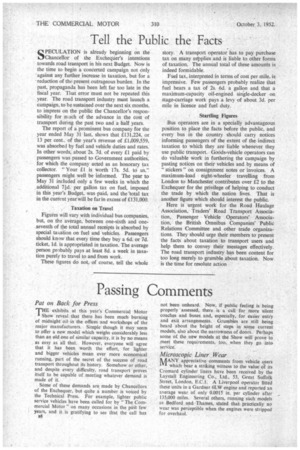Tell the Public the Facts
Page 42

If you've noticed an error in this article please click here to report it so we can fix it.
Q. PECULATION is already beginning on the Chancellor of the Exchequer's intentions towards road transport in his next Budget. Now is the time to begin a concerted campaign not only against any further increase in taxation, but for a reduction of the present outrageous burden. In the past, propaganda has been left far too late in the fiscal year. That error must not be repeated this year. The road transport industry must launch a campaign, to be sustained over the next six months, to impress on the public the Chancellor's responsibility for much of the advance in the cost of transport during the past two and a half years.
The report of a prominent bus company for the year ended May 31 last, shows that £131,224, or 13 per cent., of the year's revenue of £1,009,559, was absorbed by fuel and vehicle duties and rates. In other words, about 2s. 7d. of every El paid by passengers was passed to Government authorities, for which the company acted as an honorary tax collector. "Your £1 is worth 17s. 5d. to us," passengers might well be informed. The year to May 31 included only a few weeks in which the additional 7id. per gallon tax on fuel, imposed in this year's Budget, was paid, and the "total tax in the current year will be far in excess of £131,000.
Taxation on Travel Figures will vary with individual bus companies, but, on the average, between one-sixth and oneseventh of the total annual receipts is absorbed by special taxation on fuel and vehicles. Passengers should know that every time they buy a 6d. or 7d. ticket, Id. is appropriated in taxation. The average person probably pays at least 8d. a week in taxation purely to travel to and from work.
These figures do not, of course, tell the whole story. A transport operator has to pay purchase tax on many supplies and is liable to other forms of taxation. The annual total of these amounts is indeed formidable.
Fuel tax, interpreted in terms of cost per mile, is impressive. Few passengers probably realize that fuel bears a tax of 2s. 6d. a gallon and that a maximum-capacity oil-engined single-decker on stage-carriage work pays a levy of about 3d. per mile in licence and fuel duty.
Startling Figures Bus operators are in a specially advantageous position to place the facts before the public, and every bus in the country should carry notices informing passengers of the extent of the indirect taxation to which they are liable whenever they use public transport. Goods-vehicle operators can do valuable work in furthering the campaign by pasting notices on their vehicles and by means of " stickers " on consignment notes or invoices. A maximum-load eight-wheeler travelling from London to Manchester contributes over £2 to the Exchequer for the privilege of helping to conduct the trade by which the nation lives. That is another figure which should interest the public.
Here is urgent work for the Road Haulage Association, Traders' Road Transport Association, Passenger Vehicle Operators' Association, the British Omnibus Companies' Public Relations Committee and other trade organizations. They should urge their members to present the facts about taxation to transport users and help them to convey their messages effectively. The road transport industry has been content for too long merely to grumble about taxation. Now is the time for resolute action




















































































































































